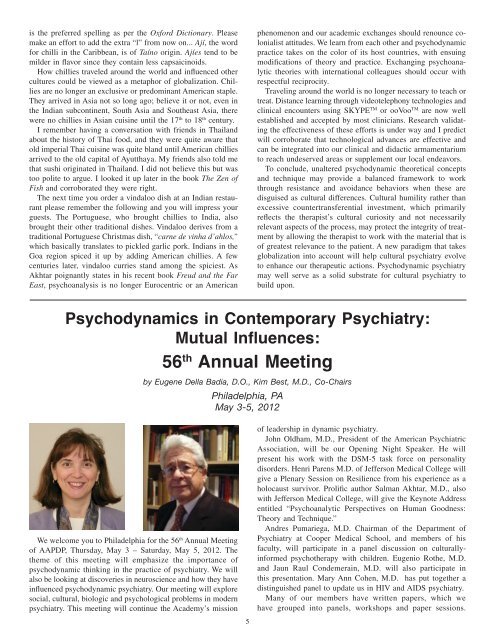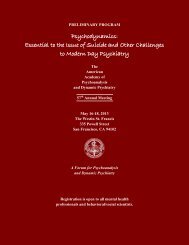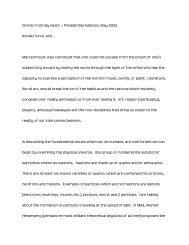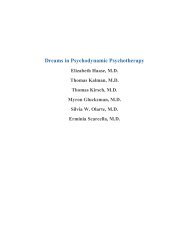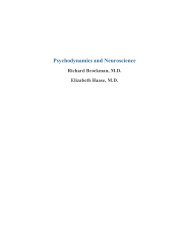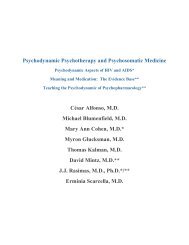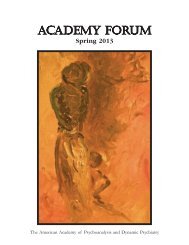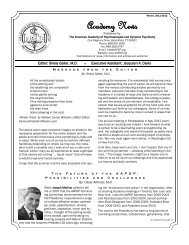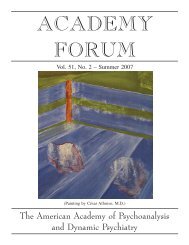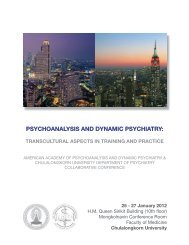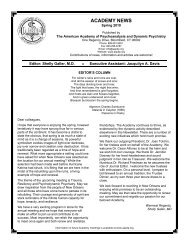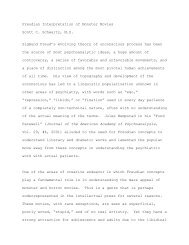ACADEMY FORUM - The American Academy of Psychoanalysis and Dynamic ...
ACADEMY FORUM - The American Academy of Psychoanalysis and Dynamic ...
ACADEMY FORUM - The American Academy of Psychoanalysis and Dynamic ...
Create successful ePaper yourself
Turn your PDF publications into a flip-book with our unique Google optimized e-Paper software.
is the preferred spelling as per the Oxford Dictionary. Please<br />
make an effort to add the extra “l” from now on... Ají, the word<br />
for chilli in the Caribbean, is <strong>of</strong> Taíno origin. Ajíes tend to be<br />
milder in flavor since they contain less capsaicinoids.<br />
How chillies traveled around the world <strong>and</strong> influenced other<br />
cultures could be viewed as a metaphor <strong>of</strong> globalization. Chillies<br />
are no longer an exclusive or predominant <strong>American</strong> staple.<br />
<strong>The</strong>y arrived in Asia not so long ago; believe it or not, even in<br />
the Indian subcontinent, South Asia <strong>and</strong> Southeast Asia, there<br />
were no chillies in Asian cuisine until the 17 th to 18 th century.<br />
I remember having a conversation with friends in Thail<strong>and</strong><br />
about the history <strong>of</strong> Thai food, <strong>and</strong> they were quite aware that<br />
old imperial Thai cuisine was quite bl<strong>and</strong> until <strong>American</strong> chillies<br />
arrived to the old capital <strong>of</strong> Ayutthaya. My friends also told me<br />
that sushi originated in Thail<strong>and</strong>. I did not believe this but was<br />
too polite to argue. I looked it up later in the book <strong>The</strong> Zen <strong>of</strong><br />
Fish <strong>and</strong> corroborated they were right.<br />
<strong>The</strong> next time you order a vindaloo dish at an Indian restaurant<br />
please remember the following <strong>and</strong> you will impress your<br />
guests. <strong>The</strong> Portuguese, who brought chillies to India, also<br />
brought their other traditional dishes. Vindaloo derives from a<br />
traditional Portuguese Christmas dish, “carne de vinha d’ahlos,”<br />
which basically translates to pickled garlic pork. Indians in the<br />
Goa region spiced it up by adding <strong>American</strong> chillies. A few<br />
centuries later, vindaloo curries st<strong>and</strong> among the spiciest. As<br />
Akhtar poignantly states in his recent book Freud <strong>and</strong> the Far<br />
East, psychoanalysis is no longer Eurocentric or an <strong>American</strong><br />
phenomenon <strong>and</strong> our academic exchanges should renounce colonialist<br />
attitudes. We learn from each other <strong>and</strong> psychodynamic<br />
practice takes on the color <strong>of</strong> its host countries, with ensuing<br />
modifications <strong>of</strong> theory <strong>and</strong> practice. Exchanging psychoanalytic<br />
theories with international colleagues should occur with<br />
respectful reciprocity.<br />
Traveling around the world is no longer necessary to teach or<br />
treat. Distance learning through videotelephony technologies <strong>and</strong><br />
clinical encounters using SKYPE TM or ooVoo TM are now well<br />
established <strong>and</strong> accepted by most clinicians. Research validating<br />
the effectiveness <strong>of</strong> these efforts is under way <strong>and</strong> I predict<br />
will corroborate that technological advances are effective <strong>and</strong><br />
can be integrated into our clinical <strong>and</strong> didactic armamentarium<br />
to reach undeserved areas or supplement our local endeavors.<br />
To conclude, unaltered psychodynamic theoretical concepts<br />
<strong>and</strong> technique may provide a balanced framework to work<br />
through resistance <strong>and</strong> avoidance behaviors when these are<br />
disguised as cultural differences. Cultural humility rather than<br />
excessive countertransferential investment, which primarily<br />
reflects the therapist’s cultural curiosity <strong>and</strong> not necessarily<br />
relevant aspects <strong>of</strong> the process, may protect the integrity <strong>of</strong> treatment<br />
by allowing the therapist to work with the material that is<br />
<strong>of</strong> greatest relevance to the patient. A new paradigm that takes<br />
globalization into account will help cultural psychiatry evolve<br />
to enhance our therapeutic actions. Psychodynamic psychiatry<br />
may well serve as a solid substrate for cultural psychiatry to<br />
build upon.<br />
Psychodynamics in Contemporary Psychiatry:<br />
Mutual Influences:<br />
56 th Annual Meeting<br />
by Eugene Della Badia, D.O., Kim Best, M.D., Co-Chairs<br />
Philadelphia, PA<br />
May 3-5, 2012<br />
We welcome you to Philadelphia for the 56 th Annual Meeting<br />
<strong>of</strong> AAPDP, Thursday, May 3 – Saturday, May 5, 2012. <strong>The</strong><br />
theme <strong>of</strong> this meeting will emphasize the importance <strong>of</strong><br />
psychodynamic thinking in the practice <strong>of</strong> psychiatry. We will<br />
also be looking at discoveries in neuroscience <strong>and</strong> how they have<br />
influenced psychodynamic psychiatry. Our meeting will explore<br />
social, cultural, biologic <strong>and</strong> psychological problems in modern<br />
psychiatry. This meeting will continue the <strong>Academy</strong>’s mission<br />
5<br />
<strong>of</strong> leadership in dynamic psychiatry.<br />
John Oldham, M.D., President <strong>of</strong> the <strong>American</strong> Psychiatric<br />
Association, will be our Opening Night Speaker. He will<br />
present his work with the DSM-5 task force on personality<br />
disorders. Henri Parens M.D. <strong>of</strong> Jefferson Medical College will<br />
give a Plenary Session on Resilience from his experience as a<br />
holocaust survivor. Prolific author Salman Akhtar, M.D., also<br />
with Jefferson Medical College, will give the Keynote Address<br />
entitled “Psychoanalytic Perspectives on Human Goodness:<br />
<strong>The</strong>ory <strong>and</strong> Technique.”<br />
Andres Pumariega, M.D. Chairman <strong>of</strong> the Department <strong>of</strong><br />
Psychiatry at Cooper Medical School, <strong>and</strong> members <strong>of</strong> his<br />
faculty, will participate in a panel discussion on culturallyinformed<br />
psychotherapy with children. Eugenio Rothe, M.D.<br />
<strong>and</strong> Jaun Raul Condemerain, M.D. will also participate in<br />
this presentation. Mary Ann Cohen, M.D. has put together a<br />
distinguished panel to update us in HIV <strong>and</strong> AIDS psychiatry.<br />
Many <strong>of</strong> our members have written papers, which we<br />
have grouped into panels, workshops <strong>and</strong> paper sessions.


